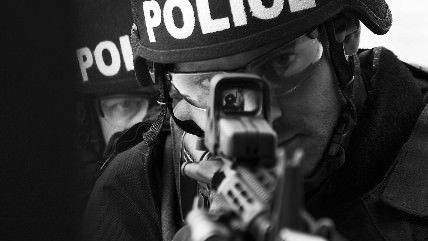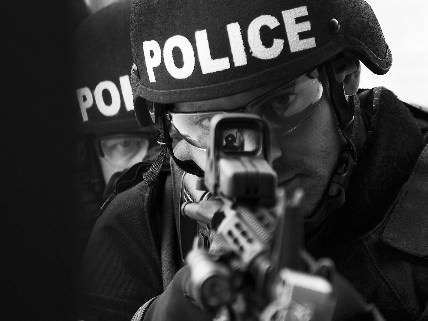In Utah, You're More Likely to be Shot Dead by a Cop Than a Criminal

The Salt Lake Tribune's Erin Alberty reports that citizens of the Beehive State are more likely to be

killed by police than gang members, drug dealers, or abusive parents. Only homicide at the hands of an intimate partner is more likely.
Culled from "media reports, state crime statistics, medical-examiner records and court records" from the past five years, the Tribune found "45 people had been killed by law enforcement officers in Utah since 2010, accounting for 15 percent of all homicides during that period."
As is common with police shootings across the country, all but one of the incidents was ruled justifiable by prosecutors, and even that one was dismissed by a judge before going to trial.
Former police lieutenant Chris Gebhart is quoted in the article conceding that there are situations when violent, and sometimes deadly, force is justified, but "There's an opportunity to de-escalate more of these situations. Officers instead are escalating these situations themselves."
Lack of sufficient training in crisis deescalation might be partially to blame for the amount of killings by police:
Scott Stephenson, director of POST (Peace Officer Standards and Training, a division of the Utah Department of Safety), said cadets receive formal training in de-escalation, including a 12-hour class on conflict resolution, eight hours on mental illness response and a session on dealing with subjects with "excited delirium" from drug use.
"We teach officers to use lower levels of force, if at all possible," Stephenson said.
But that coursework gives way to continuing training that focuses almost exclusively on using force, Gebhardt said.
"When they receive the verbal Judo class, it's one time, done and over with," Gebhardt said. "Baton training, OC spray, firearms are done on a quarterly, annual, or two-year basis. They should integrate that de-escalation training into it. When a situation deteriorates, the officer reverts to their training. … Departments really need to own, from the top down, de-escalation. They need to stress and emphasize de-escalation with the officers."
If officers are repeatedly trained on the use of deadly force, with only a cursory introduction to conflict resolution, it's hardly surprising that the lessons in keeping the peace might be forgotten, or at the very least, de-prioritized.
This article serves as a useful reminder that there is no national database of shootings by police, and save for a few journalists, academics and sports websites, no efforts to create one.


Show Comments (39)